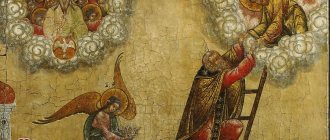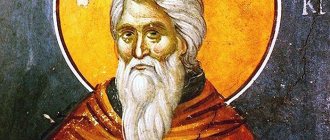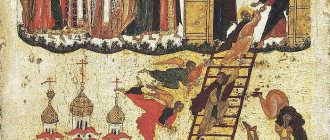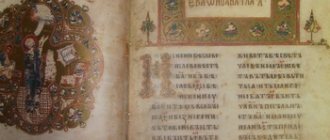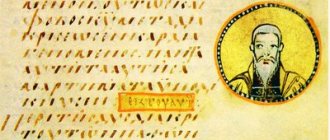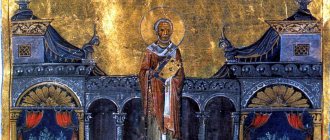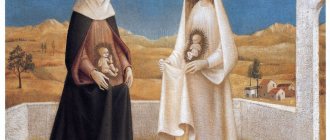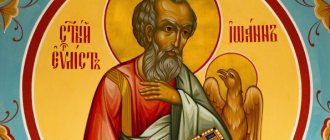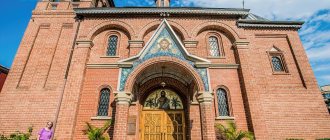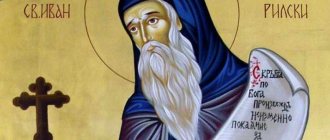Ladder
Audio
Preface of this book, called Spiritual Tablets A brief description of the life of Abba John, abbot of the holy Mount Sinai About the same Abba John, abbot of Mount Sinai, that is, the Climacus Epistle of St. John, abbot of Raifa, to the Venerable John, abbot of Mount Sinai Answer Word 1. On renunciation from the life of the world Word 2. On impartiality, that is, putting aside worries and sorrow about the world Word 3. On wandering, that is, avoiding the world Word 4. On blessed and ever-memorable obedience Word 5. On caring and real repentance and also on life saints condemned, and about prison Word 6. On the memory of death Word 7. On joyful crying Word 8. On freedom from anger and meekness Word 9. On memory of malice Word 10. On slander and slander Word 11. On much talking and silence Word 12. On lies Word 13. About despondency and laziness Word 14. About the beloved and evil ruler, the womb Word 15. About incorruptible purity and chastity, which corruptible people acquire through labor and sweat Word 16. About the love of money Word 17. About non-covetousness Word 18. About insensibility Word 19 About sleep, about prayer and psalmody in the cathedral of brethren Word 20. About bodily vigil: how we achieve the spiritual through it, and how it should pass through Word 21. About cowardly timidity, or insurance Word 22. About diverse vanity Word 23. About insane pride Word 24. About meekness, simplicity and gentleness, which do not come from nature, but are acquired through diligence and labor, and about wickedness Word 25. About the eradicator of passions, the highest humility, which occurs in the invisible feeling Word 26. About the reasoning of thoughts and passions, and of virtues Word 27. On the sacred silence of soul and body Word 28. On the mother of virtues, sacred and blessed prayer, and on standing in it with mind and body Word 29. On earthly heaven, or on God-imitating dispassion and perfection, and the resurrection of the soul before the general resurrection Homily 30. About the union of three virtues, that is, about faith, hope and love Homily 31. A special word to the shepherd, teaching what a teacher of verbal sheep should be
The work of John Climacus consists of 30 chapters, representing the “steps” of virtues along which a Christian must ascend on the path to spiritual perfection.
| Group | steps |
| Fighting worldly vanity (steps 1–4) | 1. Renunciation of worldly life 2. Impartiality (putting aside worries and sorrow about the world) 3. Pilgrimage (evading the world) 4. Obedience |
| Tribulation on the Path to True Bliss (Steps 5–7) | 5. Repentance 6. Memory of death 7. Crying over one’s sinfulness |
| Fighting vices (steps 8–17) | 8. Meekness and absence of anger 9. Removal of memory of malice 10. Foul language 11. Silence 12. Truthfulness 13. Absence of despondency and laziness 14. The fight against gluttony 15. Chastity 16. The fight against the love of money 17. Non-covetousness |
| Overcoming obstacles in the ascetic life (steps 18–26) | 18. Eradication of insensibility 19. Little sleep, zeal for brotherly prayer 20. Bodily vigil 21. Lack of fearfulness and strengthening in faith 22. Eradication of vanity 23. Lack of pride 24. Meekness, simplicity and kindness 25. Humility 26. Subversion of passions and strengthening of virtues |
| Spiritual world (stages 27–29) | 27. Silence of soul and body 28. Prayer 29. Dispassion |
| The top of the path is the union of the three main virtues (step 30) | 30. Faith, hope and love |
“The Ladder” by John Climacus. 1st stage. About renunciation of the worldly.
1. Of all the good and most good and all-good God and King (for the word to the servants of God is fitting to begin with God), intelligent and venerable creatures with the dignity of autocracy, some are His friends, others are true slaves, some are indecent slaves, others are completely alien. Him, and others, finally, although weak, nevertheless resist Him.
And His friends, O sacred Father, as we weak-minded believe, are actually intelligent and incorporeal beings surrounding Him; His true servants are all those who unlaxly and unremittingly fulfill His will, and the indecent ones are those who, although they were worthy of baptism, did not keep the vows given at it as they should. By the name of those who are alien to God and His enemies one should understand the infidels, or evil-believers (heretics); and the opponents of God are those who not only did not accept and rejected the commandments of the Lord, but also strongly armed themselves against those who fulfilled them.
2. Each of the above states requires a special and decent word; but for us ignoramuses, in the present case it is not useful to expound this at length. So let us now hasten to fulfill the command of the true servants of God, who piously compelled us and convinced us by their faith; in undoubted11 obedience we will stretch out our unworthy hand and, having accepted the reed of the word from their own mind, we will dip it in dark-looking but luminous humility; and on their smooth and pure hearts, as on some paper, or better to say, on spiritual tablets, we will begin to paint Divine words, or rather, Divine seeds, and begin like this:
3. Of all those endowed with free will, God is both the life and the salvation of all, faithful and unfaithful, righteous and unrighteous, pious and wicked, dispassionate and passionate, monks and laymen, wise and simple, healthy and infirm, young and old; since everyone without exception takes advantage of the outpouring of light, the radiance of the sun and the changes in the air; “There is no partiality with God” (Rom. 2:11).
4. The wicked is a rational and mortal creature, arbitrarily moving away from this life (God), and thinking about its ever-present Creator as non-existent. A lawbreaker is one who contains the law of God through his own evilness and thinks to combine faith in God with contrary heresy. A Christian is one who, as far as humanly possible, imitates Christ in words, deeds and thoughts, rightly and immaculately believing in the Holy Trinity.
A lover of God is one who uses everything natural and sinless and, according to his strength, tries to do good. An abstinent is one who, in the midst of temptations, snares and rumors, strives with all his might to imitate the morals of one free from all such things. A monk is one who, being clothed in a material and mortal body, imitates the life and state of the disembodied. A monk is one who adheres only to God’s words and commandments in all times, places, and deeds.
The monk is the ever-present compulsion of nature and the unflagging preservation of feelings. A monk is one who has a purified body, clean lips and an enlightened mind. A monk is one who, while grieving and sick in soul, always remembers and reflects on death, both in sleep and in vigil. Renunciation of the world is voluntary hatred of the substance praised by the worldly, and the rejection of nature in order to obtain those benefits that are above nature.
5. All who diligently left worldly things, without a doubt, did this either for the sake of the future kingdom, or because of the multitude of their sins, or out of love for God. If they did not have any of these intentions, then their removal from the world was reckless. However, our good hero is waiting to see what the end of their course will be.
6. Let him who came from the world in order to get rid of the burden of his sins imitate those who sit over the tombs outside the city, and let him not cease to shed warm and hot tears, and let him not interrupt the silent sobs of his heart, until he will not see Jesus, who came and rolled away the stone of bitterness from the heart, and our mind, like Lazarus, who loosed the bonds of sin, and commanded His servants, the angels: “Loose him from his passions and let him go” (John 11:44), to blissful dispassion. If not, then (from being removed from the world) there will be no benefit to him.
7. When we want to leave Egypt and flee from Pharaoh, then we also have a necessary need for a certain Moses, that is, an intercessor to God and for God, who, standing in the midst of action and vision, would raise his hands to God for us, so that those instructed by him crossed the sea of sins and defeated Amalek’s passions. So, those were deceived who, having placed their trust in themselves, considered that they had no need for any guide; for those who came out of Egypt had Moses as their teacher, and those who escaped from Sodom had an angel. And some of them, that is, those who came from Egypt, are similar to those who, with the help of doctors, heal spiritual passions, while others are similar to those who want to remove the uncleanness of the accursed body; That’s why they require an assistant - an Angel, that is, an equal-angelic husband; for due to the rottenness of the wounds, we also need a very skillful doctor.
8. Those who attempt to ascend to heaven with their body truly need extreme compulsion and incessant sorrow, especially at the very beginning of renunciation, until our voluptuous disposition and insensitive heart are transformed into love of God and purity by true crying. For labor, truly labor and great hidden sorrow are inevitable in this feat, especially for the careless, until our mind, this fierce and voluptuous dog, through simplicity, deep lack of anger and diligence, becomes chaste and prudent. However, let us be complacent, passionate and exhausted; Our weakness and spiritual impotence with undoubted faith, as with the right hand, presenting and confessing to Christ, we will certainly receive His help, even beyond our dignity, if only we always lower ourselves into the depths of humility.
9. All those embarking on this good deed, cruel and cramped, but also easy, should know that they have come to be thrown into fire, if only they want immaterial fire to take possession of them. Therefore, let everyone tempt himself, and then let him eat from the bread of the monastic life, which is with a bitter potion, and let him drink from this cup, which is with tears: let him not fight against himself in judgment. If not everyone who is baptized will be saved, then... I will remain silent about what follows.
10. Those who come to this feat must renounce everything, despise everything, laugh at everything, reject everything, in order to lay a solid foundation for them. The good foundation, three-part or three-pillar, consists of gentleness, fasting and chastity. Let all infants in Christ begin with these virtues, taking as an example sensual infants, who never have anything malicious, nothing flattering; They have neither insatiable greed, nor an insatiable belly, nor bodily fertilization; it appears later, with age, and may be due to the increase in food.
11. It is truly worthy of hatred and disastrous when the fighter, upon entering the struggle, weakens, thereby showing a sure sign of his imminent victory. From a strong beginning, there will no doubt be benefit to us, even if we subsequently weaken; for the soul, which was previously courageous and weakened, is awakened by the memory of former jealousy, like a sharp instrument, therefore, many times some raised themselves in this way (from relaxation).
12. When the soul, betraying itself, destroys the blessed and longed-for warmth, then let it diligently investigate for what reason it lost it: and let it direct all its labor and all its diligence to this reason; for the former warmth cannot be returned except through the same doors through which it came out.
13. He who renounces the world out of fear is like incense, which first smells fragrant and then ends in smoke. He who has left the world for the sake of retribution is like a millstone, which always moves in the same way; and he who comes out of the world out of love for God at the very beginning acquires fire, which, being thrown into matter, soon ignites a strong fire.
14. Some people build bricks on top of stones; others established pillars on the ground; and others, having walked a short part of the way and warmed up their veins and members, then walked faster. Let him who understands understand what this fortune-telling word means13.
15. As those called by God and the King, let us diligently set out on the road, so that we, who have a short time on earth, on the day of death will not appear barren and perish from hunger. Let us please the Lord as soldiers please the King; for having entered into this rank, we are subject to a strict answer regarding service. Let us fear the Lord even as we fear beasts; for I saw people going to steal, who did not fear God, but when they heard the barking of dogs there, they immediately returned back, and what the fear of God did not do, the fear of animals managed to do.
Let us love the Lord even as we love and honor our friends: for many times I have seen people who angered God and did not care at all about it, but the same ones, having upset their friends in some small way, used all their art, invented all sorts of ways, expressed in every possible way They apologized to them for their grief and their repentance, both personally and through others, friends and relatives, and sent gifts to the offended, just to return their former love.
16. At the very beginning of renunciation, without a doubt, we fulfill virtues with difficulty, compulsion and sorrow; but having succeeded, we cease to feel sorrow in them, or we feel it only a little; and when our carnal wisdom is defeated and captivated by zeal, then we commit them with all joy and zeal, with lust and Divine flame.
17. How commendable are those who from the very beginning fulfill the commandments with all joy and zeal: how worthy of pity are those who, having spent a long time in monastic training, still with difficulty perform, although they do, feats of virtue.
18. Let us not despise or condemn such renunciations that occur due to circumstances; for I saw those who were on the run, who, having accidentally met the king, against their will, followed him, and having entered the palace with him, they sat down with him to eat. I saw that the seed that accidentally fell to the ground bore abundant and beautiful fruit; just as the opposite happens. Again I saw a man who came to the hospital not to be treated, but for some other need, but, attracted and held by the doctor’s affectionate reception, he freed himself from the darkness that lay before his eyes. Thus, the involuntary in some was firmer and more reliable than the voluntary in others.
19. No one should, exposing the severity and multitude of his sins, call himself unworthy of the monastic vow, and for the sake of his voluptuousness, imaginaryly humiliate himself, inventing excuses for his sins (Ps. 141:4): for where there is a lot of rottenness, there is a need for strong healing , which would cleanse the filth; and healthy people do not go to the hospital.
20. If the earthly king called us and wanted to place us in service before his face; we would not hesitate, we would not apologize, but leaving everything, we would diligently rush to him. Let us pay attention to ourselves, so that when the King of kings and the Lord of lords and the God of gods calls us to this heavenly order, we do not refuse out of laziness and cowardice, and at His great judgment we do not appear unanswered.
One who is bound by the bonds of everyday affairs and cares can walk, but it is uncomfortable; for they also often walk with iron fetters on their feet: but they stumble many times, and receive wounds from this. An unmarried person, but only bound by affairs in the world, is like one who has shackles on one hand; and therefore, whenever he wishes, he can freely resort to monastic life; a married man is like one who has fetters on his hands and feet.
21. Some people who live carelessly in the world asked me, saying: “How can we, living with our wives and entwined with worldly cares, imitate the life of a monk?” I answered them: “Do whatever good you can do; do not reproach anyone, do not steal, do not lie to anyone, do not be proud of anyone, do not have hatred for anyone, do not leave church meetings, be merciful to those in need, do not seduce anyone, do not touch someone else's part, be satisfied with the dues of your wives. If you do this, you will not be far from the kingdom of heaven.”
22. Let us begin this good deed with joy and fear; Let us not be afraid of our enemies, for they look at the face of our soul, although they themselves are invisible; and when they notice that it has changed due to fear, then these insidious ones arm themselves more fiercely against us, knowing that we are afraid. So let us arm ourselves against them complacently, for no one dares to fight with a courageous fighter.
23. The Lord, in His special providence, made the battle easier for the beginners, so that at the very beginning they would not immediately return to the world. So always rejoice in the Lord, all you servants of God, seeing in this the first sign of the Lord’s love for you, and that He Himself has called you. However, we know that God often acts in other ways; that is, when He sees courageous souls, from the very beginning He allows them to be attacked, wanting to crown them quickly. But from those living in the world the Lord hid the inconvenience, or better yet, the convenience of this field; for if they knew this, no one would renounce the world.
24. Diligently offer to Christ the labors of your youth and you will rejoice in the wealth of dispassion in old age: for what is collected in youth nourishes and comforts those who are exhausted in old age. Young! Let us labor zealously, let us flow soberly; for death is unknown. We have enemies who are crafty and evil, insidious, sneaky, who hold fire in their hands and want to burn the temple of God with the very flame that is in it, enemies who are strong and never sleep, insubstantial and invisible. So, no young person should listen to hostile demons when they inspire him, saying: “Do not wear out your body, lest you fall into illness and disease.” For there is hardly anyone, especially in the present generation, who decides to kill his body, although some deprive themselves of many sweet foods; The intention of the demons in this case is to make our very entry into the feat weak and careless, and then the end consistent with the beginning.
25. Those who wish to truly work for Christ, first of all, should make an effort to, with the help of spiritual fathers and their own reasoning, choose for themselves decent places and ways of life, paths and training: for community life is not useful for everyone, due to voluptuousness. And not everyone is capable of silence because of anger; but each one must consider which path suits his qualities.
26. The entire monastic life is contained in three main dispensations and images of ascetic achievement: either in ascetic solitude and hermitage; or in being silent with one and, many, with two; or, finally, to remain patiently in the hostel. “Do not turn aside,” says Ecclesiastes, “not on the right hand, nor on the right hand” (Prov. 4:27), but follow the royal path. The average of these ways of life is decent for many; - for the same Ecclesiastes says: “Woe to one,” for if he “falls” into despondency (Eccl. 4:10), or into drowsiness, or into laziness, or into despair, then there is no one “to raise him up.” “And where there are two or three congregations in My name, I am in the midst of them,” said the Lord (Matthew 18:20).
27. So, who is the faithful and wise monk? Who kept his ardor unquenchable, and even until the end of his life did not cease every day to add fire to fire, ardor to ardor, zeal to zeal, and desire to desire.
First degree. Whoever has entered into it, do not turn back.
Preface to this book, called "Spiritual Tablets"
To all who hasten to write their names in the book of life in heaven, this book shows the most excellent way. Walking this path, we will see that she infallibly guides her subsequent instructions, keeps them unscathed from any stumbling, and presents us with an established ladder, leading from the earthly to the Holy of Holies, at the top of which the God of love is established. I think Jacob, the champion of passions, saw such a ladder when he rested on his ascetic bed. But let us ascend, I beg you, with zeal and faith to this mental and heavenly ascent, the beginning of which is the renunciation of earthly things, and the end is the God of love.
The venerable father wisely decided by arranging for us an ascent equal to the age of the Lord in the flesh, for at the age of thirty years of the Lord’s coming of age, he divinely depicted a ladder consisting of thirty degrees of spiritual perfection, along which, having reached the fullness of the age of the Lord, we will appear truly righteous and inexorable to fall . And whoever has not reached this measure of age is still a baby and, according to the exact testimony of the heart, will turn out to be imperfect. We considered it necessary, first of all, to place in this book the life of the (venerable) wise father, so that readers, looking at his exploits, would more easily believe his teaching.
John's Answer to John Wants to Rejoice
I have received truly worthy of your lofty and dispassionate life and your pure and humble heart, sent by you to us, the poor and poor in virtues, your honest writing, or, better said, a commandment and command that surpasses our strength. So, it is truly natural for you and your sacred soul to ask for an instructive word and instruction from us, untrained and ignorant in deed and word, for it is accustomed to always show us in itself an example of humility. However, I will also say now that if we were not afraid of falling into great trouble by rejecting from ourselves the holy yoke of obedience, the mother of all virtues, then we would not have recklessly dared to undertake an enterprise that exceeds our strength.
You, wonderful father, should, when asking about such subjects, learn from men who knew this well, for we are still in the category of students. But just as our God-bearing fathers and secret teachers of true knowledge define that obedience is undoubted submission to those who command and in those matters that exceed our strength, then we, piously despising our weakness, humbly encroached on labor that exceeded our measure; although we do not think of bringing you any benefit or explaining something that you, the sacred head, know no less than us. For not only I am sure, but, I think, everyone who is sane knows that the eye of your mind is pure from all earthly and gloomy disturbances of gloomy passions and uncontrollably looks at the Divine light and is illuminated by it.
But, fearing death, born from disobedience, and as if driven by this fear to obey, I began to fulfill your all-honorable command with fear and love, like a sincere obedient and indecent slave of the most excellent painter, and with my meager knowledge and insufficient expression, only Having monotonously inscribed living words in ink, I leave it to you, chief of teachers and official, to decorate and understand all this and, as the executor of the tablets and the spiritual law, to fill in what is insufficient. And I am not sending this work to you - no, this would be a sign of extreme foolishness, for you are strong in the Lord not only to confirm others, but also to confirm us ourselves in divine morals and teachings, but to the God-called squad of brothers who, together with us, learn from you oh, chosen teacher! To them, through you, I begin this word of theirs and with your prayers, as if being lifted up by some waters of hope, with all the weight of ignorance I stretch out the sail of the cane and with every prayer I convey the feed of our words into the hands of our good co-pilot. Moreover, I ask all readers: if anyone sees something useful here, then let him attribute the fruit of all this, as a prudent person, to our great mentor, and let us ask for reward from God for this weak work, not looking at the poverty of the composition (truly filled with any inexperience), but accepting the intention of the offerer as a widow's offering[9], for God rewards not the multitude of gifts and labors, but the multitude of zeal.
Epistle of Saint John, Abbot of Raifa, to the Venerable John, Abbot of Mount Sinai
The sinful Raifa abbot wishes to rejoice in the Lord to the supreme and equal-angelic father of fathers and the most excellent teacher.
Knowing first of all your unquestioning obedience to the Lord, adorned, however, with all the virtues, and especially where it is necessary to increase the talent given to you by God, we, the poor, use a truly wretched and insufficient word, recalling what is said in Scripture: ask your father , and your elders will tell you, and tell you
(Deut. 32:7).
And therefore, falling to you, as the common father of all and the eldest in asceticism, the strongest in quick-wittedness and the most excellent teacher, with this scripture we pray to you, oh, head of virtues, teach us, the ignorant, what you saw in the vision of God, like an ancient Moses, and on the same mountain, and set it down in a book, as on the tablets written by God, for the edification of the new Israelites, i.e. people newly emerged from mental Egypt and from the sea of life. And just as you, in that sea, instead of a rod with your God-speaking tongue, with the assistance of God, worked miracles, now, without despising our petition, you deigned in the Lord for our salvation to judiciously and unlaxly inscribe the laws inherent and proper to monastic life, being truly a great mentor to all who began such angelic residence. Do not think that our words come from flattery or caressing: you, O sacred head, know that we are alien to such actions, but what everyone is sure of, what is beyond any doubt, visible to everyone and what everyone testifies to, we repeat. So, we hope in the Lord to soon receive and kiss the precious inscriptions we are expecting on these tablets, which can serve as an infallible instruction for the true followers of Christ - and, like a ladder
established even to the gates of heaven (see Gen. 28:12), it raises up those who will. so that they pass through the hordes of spirits of evil, rulers of darkness and princes of the air harmlessly, safely and without hindrance. For if Jacob, the shepherd of dumb sheep, saw such a terrible vision on the ladder, then how much more can the leader of the verbal lambs not only by vision, but also by deed and truth [8] show everyone the infallible ascent to God. Hello in the Lord, most honest father!
How to read for a lay person?
— How to read “The Ladder” to a layman who has decided to take his spiritual life seriously?
— As I said earlier, “The Ladder” was written, first of all, for monks. Therefore, it is impossible to implement all the requirements of this book in ordinary worldly life. Monastic life differs in many ways from life in the world - these are different paths, different measures of deeds. Also, despite the fact that “The Ladder” is strictly systematized and full of all kinds of life examples, much of what is written is not easy for the average parishioner to understand. Another feature of ascetic works is that very little attention is paid to the Church Sacraments, in particular Confession and Communion, and this should be the basis of a Christian’s life and should come first. It would be good if there was a lecture hall at the temple, where one could study the “Ladder”, analyze the commentaries on it, and ask the priest for advice. If this is not possible, then with reasoning you can read it yourself, also in accordance with what you read with the advice of your confessor, and the Lord, seeing the person’s intention to improve, will help you assimilate what you read and follow the path of exterminating your passions and acquiring virtues. Indeed, despite the difference in the extent of deeds for monastics and laity, the Gospel ideal of holiness is the same, and the highest virtue for every Christian is love.
Prepared by 3rd year SPDS student Denis Kamenshchikov Newspaper “Orthodox Faith” No. 5 (409) 2010
Spiritual ladder leading to heaven
Reality
I saw a spiritual ladder of virtues leading to heaven, calculated according to the years of Christ incarnate. The beginning of this spiritual ladder leading to heaven is based on the renunciation of the world and everything earthly in all thoughts, deeds and desires. And its end is confirmed in the Holy of Holies. The steps of this spiritual ladder leading to heaven are constructed differently, according to their origin. And, constantly walking along this spiritual ladder, let each of us reliably watch our foot, which step we stand on, and not slip while ascending it. And he climbs this ladder both in deed and in thought. And having reached its summit, everyone who loves God will stand on it.
Interpretation
Living the commandments and doing good deeds is like climbing stairs. That is why they are called the spiritual ladder, leading to heaven, the commandments of the Lord and the virtues of the fathers. And we, as if climbing a ladder, go up step by step. And if someone starts to step over two or three, he will slip, fall to the ground and break. The same applies to the commandments and virtues. To the one who begins to circumvent the first commandments and virtues, the latter will not submit, but will begin to resist. Therefore, one should assimilate one after another, as if climbing the steps of a ladder.
Reality
I will also call this ladder the saving, true and reliable path along which many walk. And everyone follows this path because they are invited to the big city. But few achieve it, only the chosen ones. The rest are delayed, no matter where. Those - having barely begun this path, these - having reached halfway and straying onto other paths. Some, who have already reached the great city this way, are overtaken by night at the gates, and they do not have time to go inside. Others, diligently following this path, having set their hearts on fire, immediately, like a swift deer, reach the great city before dark and joyfully enter inside. And some, no more nor less, do not want to walk this ladder and this difficult path.
Interpretation
And how many are called and how many are chosen, walking this saving path? For the Lord God says in the Holy Gospel: “Many are called, but few are chosen” (Luke 14:24). Indeed, the Lord God calls the whole world to salvation in the Holy Gospel and other holy books. But there are few chosen ones who have heard His call. That is why the Lord Himself calls them a small flock. As if comforting His chosen flock both with His hand and with His word, delivering them from all need and protecting them. And he says: “Do not be afraid, little flock! For it has been your Father’s good pleasure to give you the Kingdom” (Luke 12:32).” (“Flower Garden” by Hieromonk Dorotheus).
The beginning of the path of salvation is firm determination and courage to live according to faith and the commandments of God in unflagging patience of all the sorrows found here. So, in order to decide to fearlessly follow Christ and not turn back to your former passions and sinful habits and not be like Lot’s wife, who escaped from the burning city, but died on the road itself, becoming a pillar of salt. For “no one who puts his hand to the plow and looks back is fit for the Kingdom of God” (Luke 9:62). Every day we live, in which we have overcome our will and lust in some way in order to preserve and fulfill the holy commandment, is like a new step to climb upward.
Just as heaven is far from the earth, so the human soul at the beginning of its achievement is still far from perfection. But gradually the hardworking ascetic, with much care and diligence, with constant self-denial, rises to the imperishable world, overcoming such sorrows and obstacles that only those who have themselves walked this path can know about. “Spiritual warfare” is a narrow and thorny road uphill, from earth to heaven, where we must “crucify” together with Christ in order to become worthy of heavenly abodes and eternal life.
In the “Ladder” of St. John of Sinai there is an amazing story about the feat of one hermit, Abba Isidore, from whose example one can clearly see how the inner world of a person is gradually transformed, wanting to lag behind the sinful habit and live according to the Lord’s Gospel word.
Is it really only up?
— Is it true that you can only go up the spiritual ladder?
- Is it true. In spiritual life, in the struggle with one’s passions, there is only one path - to virtues, to God. The miniatures illustrating the “Ladder” depict how ascetics ascend upward, and some of them, tempted by demons, fall from various steps into the abyss, which is symbolically represented by a cleft in the rock. I think every Christian knows from his own experience how easy it is to deviate from the intended path. Once you loosen your prayer rule for a day or two, it becomes very difficult to restore it later. Therefore, a Christian must constantly work on himself, no matter what level of spiritual development he is at.
"The Ladder" and other patristic works
— What place does “The Ladder” occupy in spiritual literature?
— Thanks to its systematic nature, “The Ladder” was recognized from the very beginning as one of the best works of spiritual literature. Prior to this, in the works of the holy fathers, much attention was paid to the dogmatic teaching of the Church, and “The Ladder” is devoted mainly to man’s struggle with passions and the acquisition of virtues. That is, this work is ascetic. Yes, even before the appearance of “The Ladder,” spiritual literature knew ascetic works, but these works spoke about one or several aspects of Christian life, and “The Ladder” covers all aspects of asceticism: from a person’s conversion to Christ to complete deliverance from passions.
— You teach a course in asceticism at the Saratov Orthodox Theological Seminary. What place does The Ladder have in the curriculum?
— The seminary course on asceticism necessarily includes the study of “The Ladder.” Throughout the year, students receive assignments to read certain sections of this work and then what they have learned is retold in class. However, this does not exclude reading other ascetic works, but is given as a basis, as a certain minimum.
— Did Russian monasticism know this book?
- Certainly. “The Ladder,” like other patristic works, was translated from Greek and found wide circulation in our monasteries. Russian monks saw in this work the ideals of holiness that they were striving for. In addition, the statutes of our monasteries and, in general, the entire spirit of Russian monasticism were largely based on Eastern monastic traditions.
Thanks to monasteries - these centers of spiritual enlightenment - “The Ladder” becomes known to the laity. After all, this is now at the service of readers - books of various contents, magazines, newspapers... And our ancestors drew their knowledge from spiritual works - this pure source of knowledge about God, about man, about salvation.
"The Ladder" and Lent
— Why exactly during the period of the Holy Pentecost does the Church remember the life and works of St. John Climacus?
— Fasting, as you know, is a time of deep repentance. During the period of the Holy Pentecost, the entire structure of church life introduces the believer into a saving atmosphere of repentance and work on oneself. This includes restricting sleep and food, and eliminating all kinds of amusements; and if we talk about the liturgical side of Great Lent, then this includes the reading of the Great Penitential Canon of St. Andrew of Crete, and the passion, or service of the Passion of Christ, and kneeling prayers, and much, much more. So, having found himself in this atmosphere and having acquired the determination to correct his life, a person will not find a more convenient time for this than Great Lent, and a more accessible and universal work than the “Ladder” of St. John. “The Ladder” is a guide in the field of spiritual correction; this work helps to make your repentance active.
